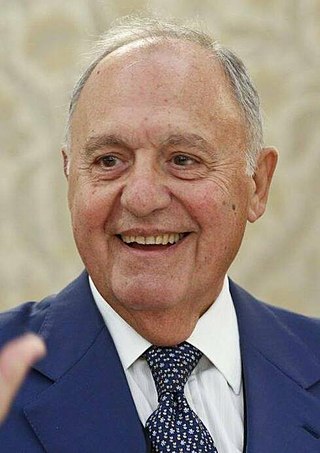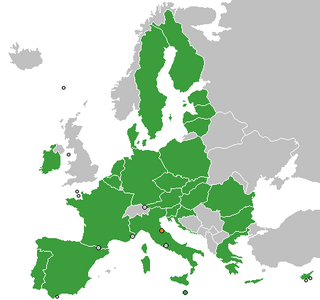Related Research Articles

The European Union (EU) is a supranational political and economic union of 27 member states that are located primarily in Europe. The Union has a total area of 4,233,255 km2 (1,634,469 sq mi) and an estimated total population of over 448 million. The EU has often been described as a sui generis political entity combining the characteristics of both a federation and a confederation.

Pan-Slavism, a movement that took shape in the mid-19th century, is the political ideology concerned with promoting integrity and unity for the Slavic people. Its main impact occurred in the Balkans, where non-Slavic empires had ruled the South Slavs for centuries. These were mainly the Byzantine Empire, Austria-Hungary, the Ottoman Empire, and Venice.
The Ukrainian language is an East Slavic language of the Indo-European language family spoken primarily in Ukraine. It is the native language of a majority of Ukrainians.

The Volga is the longest river in Europe. Situated in Russia, it flows through Central Russia to Southern Russia and into the Caspian Sea. The Volga has a length of 3,531 km (2,194 mi), and a catchment area of 1,360,000 km2 (530,000 sq mi). It is also Europe's largest river in terms of average discharge at delta – between 8,000 m3/s (280,000 cu ft/s) and 8,500 m3/s (300,000 cu ft/s) – and of drainage basin. It is widely regarded as the national river of Russia. The hypothetical old Russian state, the Rus' Khaganate, arose along the Volga c. 830 AD. Historically, the river served as an important meeting place of various Eurasian civilizations.

The Baltic states or the Baltic countries is a geopolitical term encompassing Estonia, Latvia, and Lithuania. All three countries are members of NATO, the European Union, the Eurozone, and the OECD. The three sovereign states on the eastern coast of the Baltic Sea are sometimes referred to as the "Baltic nations", less often and in historical circumstances also as the "Baltic republics", the "Baltic lands", or simply the Baltics.

The European Union (EU) has expanded a number of times throughout its history by way of the accession of new member states to the Union. To join the EU, a state needs to fulfil economic and political conditions called the Copenhagen criteria, which require a stable democratic government that respects the rule of law, and its corresponding freedoms and institutions. According to the Maastricht Treaty, each current member state and the European Parliament must agree to any enlargement. The process of enlargement is sometimes referred to as European integration. This term is also used to refer to the intensification of co-operation between EU member states as national governments allow for the gradual harmonisation of national laws.

Eurolinguistics is a neologistic term for the study of the languages of Europe. The term Eurolinguistics was first used by Norbert Reiter in 1991. Apart from a series of works dealing with only a part of the European languages, the work of Harald Haarmann pursues a "pan- or trans-European perspective". This goal is also pursued by Mario Wandruszka.

Giulietto Chiesa was an Italian journalist, author, lecturer and politician. He was Vice-President of the European Parliament Committee on International Trade and a member of two Extraordinary Committees inside the European Parliament: the Extraordinary Renditions Committee and the Climate Change Committee. He was the founder of the cultural association Megachip. Democracy in Communications. He was the Chief Editor of the web TV Pandora TV.
Giuseppe Tarantino was an Italian philosopher, professor of moral philosophy and pedagogy and rector at the University of Pisa, Italy.

Eva Cantarella is an Italian classicist. She is professor of Roman law and ancient Greek law at the University of Milan, and has served as Dean of the Law School at the University of Camerino.
Slavic microlanguages are literary linguistic varieties that exist alongside the better-known Slavic languages of historically prominent nations. The term "literary microlanguages" was coined by Aleksandr Dulichenko in late 1970s; it subsequently became a standard term in Slavistics.

On 1 January 2007, Bulgaria and Romania became member states of the European Union (EU) in the fifth wave of EU enlargement.

Paolo Savona is an Italian economist, professor, and politician. He was the Italian Minister of European Affairs from 1 June 2018 until 8 March 2019, his second stint in government after 1993–1994. During the 2010s, Savona became one of the most fervent Eurosceptic economists in Italy.

Antonio Preto was an Italian lawyer who was a civil servant of the European Parliament and from 2012 a member of the Italian regulator for Communications and the Audiovisual sector, Commissioner for Infrastructure and Networks. During his career in Brussels he dealt in particular with regulation issues and European policies concerning the right of establishment and the freedom to provide services, competition, e-commerce, copyright in the information society, consumer protection, industry and technological innovation. He also followed privatization and takeover beats of European important firms and EU controversy. Europe has been the common thread of his career. He participated in all the major debates on European integration and the future of the European Union. He closely followed the developments of the European Convention for a Constitutional Treaty, the enlargement process, the single market, the liberalization of the professions in Italy and Europe, the debate on the economical governance and the evolution of the professions' liberalization in Italy and Europe. Moreover, he also followed the interaction between the free market and the European construction.

Relations between the Republic of San Marino and the European Union (EU) began in February 1983. San Marino is completely surrounded by one EU member state, Italy.

Italian Council of the European Movement is an Italian advocacy group.
Sergio Fabbrini is an Italian political scientist. He is Head of the Department of Political Science and Professor of Political science and International relations at Libera Università Internazionale degli Studi Sociali Guido Carli in Rome, where he holds the Intesa Sanpaolo Chair on European Governance. He had also the Pierre Keller Visiting Professorship Chair at the Harvard University, Kennedy School of Government (2019/2020). He is the co-founder and former Director of the LUISS School of Government He is also recurrent professor of Comparative Politics at the Institute of Governmental Studies at the University of California at Berkeley.
Roberto Gargiani is an Italian architectural historian and a full professor at the École Polytechnique Fédérale de Lausanne (EPFL).

Eugenia Maria Roccella is an Italian journalist and politician, who has been serving as Minister for Family, Natality and Equal Opportunities in the Meloni Cabinet since 22 October 2022. She is a member of Brothers of Italy (FdI), the party led by the prime minister of Italy, Giorgia Meloni.
References
- ↑ Битва Николаевки 1943 – 2003 г. EuropaRussia, 2009 г.
- ↑ Ледяной ад Рады Газета Тамбовское время, Тамбов 2003 г., EuropaRussia, 2009 г.
- ↑ Katyń. Andrzej Wajda. The defeat of the silence. EuropaRussia, 24 March 2008
- ↑ Italian reports EuropaRussia
- ↑ Slavic Review Volume 56 3:566
- ↑ Travel Hansa EuropaRussia.
- ↑ EuroDream and new Walls EuropaRussia.